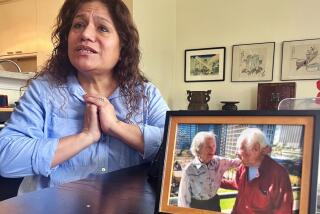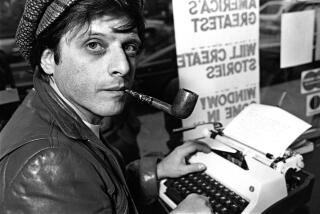A Man of Letters--Many, Many Letters
NEW YORK — For Edward Robb Ellis, 1995 was a very good year. You could look it up.
Ellis is one of the leading diarists of this or any other time--he once wrote his way into the Guinness Book of World Records--and, after nearly seven decades, persists in charting the day’s hits and errors as assiduously as a Little League coach in a pennant chase.
Lately, Ellis, 84, a former newspaper reporter and author of several books, has been busily taking inventory of events that might make a chapter called “How I Escaped Obscurity After All.”
“If what is happening is that I am becoming ‘famous’--and I use the word gingerly--I want to make sure I have every detail as it happens,” Ellis remarked recently at his home in Manhattan.
It is difficult to say that celebrity has come suddenly to a writer of Ellis’ age but, with a certain happy abruptness, serious attention is being paid.
His book of selected journal entries, “A Diary of the Century: Tales From America’s Greatest Diarist,” was published last fall by Kodansha America, and reviewers saluted Ellis’ fetching style, durability and dedication. Time magazine characterized “Diary of the Century” as a “glorious mishmash” of reminiscences and a “national treasure” for historians.
The Richmond (Va.) Times Dispatch said, “Every country should be so lucky as to have an Edward Ellis,” and in his introduction to the book, columnist Pete Hamill declared: “There are humans not yet born who will be helped in understanding our times through the diaries of Edward Robb Ellis. That is his accomplishment. That is his triumph.”
Ellis’ “triumph” inspired newspaper articles, radio interviews and a reading at a New York City book store. British television is considering a documentary, movie people are looking at “Diary” and someone contacted Ellis about appearing in a series of TV commercials featuring elderly folks who refuse to act their age. Recently, a fan called from Capetown, South Africa, just to chat, and a few days later called again.
“South Africa!” exclaimed Ellis.
*
If not exactly skyrocketing, his literary career is cruising along at an enviable clip. In October, Kodansha issued a softbound version of a previous Ellis work, “A Nation in Torment: The Great American Depression, 1929-1939.” Ellis’ highly praised 1966 effort, “Epic of New York City: A Narrative History,” continues to sell after being reprinted in 1990 (Marboro Books). He served as an associate editor on the recently published reference volume “The Encyclopedia of New York City.” And now the dean emeritus of deja vu is working on a second volume of diary selections.
Ellis may have emerged from memory lane at the right moment. The public appetite for confessionals--tell-all TV, supermarket tabs and celebrity bestsellers (in the ‘90s, even Howard Stern is a man of letters)--enhances any book promising a peek inside someone else’s tent. However, Ellis thinks in more noble terms. Verisimilitude, not venality, is the key, he says.
“It is an honest book published in a dishonest era,” he says of the thick volume that sports a cameo-shaped photograph of him on the dust jacket. “People are sick and tired of these lying politicians in Washington, sick and tired of all these egomaniacs in Hollywood. What I do is talk about my failures as well as my alleged successes.”
Success, failure, triumph and setback--Ellis was always intrepid in his account-keeping.
“I admit I’m flawed,” he said recently, though outwardly, Ellis seemed quite splendid in safari jacket, red bandanna, wine-colored beret, blue jeans and cowboy boots. Layered so elaborately, the diarist looked like an actor auditioning for several roles at the same time.
In the mellow light of his apartment, Ellis’ cheeks and nose and strong, straight mouth emerged from a snow squall of white hair and whiskers. His writerly presence was emphasized by shelves of books--15,000 titles, Ellis says--and it seemed certain that whatever his shortcomings, Eddie Ellis was not guilty of sloth or ignorance or intellectual complacency.
Reading, writing--Ellis is devoted to nothing else. Emphysema has kept him homebound for two months, but his life is mostly internal, anyway. When he can no longer open a book or pound out a diary entry on his old Hermes 3000 manual, Ellis says, he’d just as soon quit breathing.
*
Since he began his diary on Dec. 27, 1927, as a 16-year-old schoolboy in Kewanee, Ill., Ellis demonstrated a gift for candor and knack for words--even if he occasionally faltered in the spelling department. (In that first entry, he described his assortment of Christmas gifts as “hetregeneous.”)
Through the years, he wrote about his struggle with alcoholism and depression, the loss of his beloved wife, Ruthie, in 1965, his 18 months in psychoanalysis, his experimentation with marijuana, his interest in mysticism. He talks about flunking out of the University of Missouri (he later returned) and being fired from newspaper jobs (he got better ones). In a bold entry, he revealed details of a teenage tryst during which the earnest Ellis developed a nosebleed during warmups.
Still, it is not quite true that Ellis’ life is entirely an open book. The writer estimates that he is only “99%” honest and says the other 1% is nonnegotiable. What is he, anyway? Crazy?
“My sins, I ain’t gonna tell you,” says Ellis. “Anybody’d have to be a damn fool to expose absolutely everything he’d done, thought, imagined, fantasized.”
With the exception of a few periods when illness interfered and the painful time following the death of Ruth, Ellis says he made notations faithfully. He persevered even when drinking heavily, Ellis says, though entries sometimes said nothing more than: “Hung over.” (Ellis says he hasn’t had to make such a confession for many years.)
Why has Ellis remained so devoted to a project he began in high school as a contest--two pals started diaries with him but their devotion faltered quickly--mostly because he had nothing better to do?
Ellis says he realizes at some point that his jottings--he scribbles in a red Daily Reminder date book and then, banging away on the Hermes, expands and polishes his observations--amount to more than a collection of random thoughts. His skills as a writer, interest in philosophy, experiences as a reporter and forthright approach gave the entries a special oomph.
In 1981, Guinness cited Ellis as author of the world’s longest diary--the journals (one for each year) now tally more than 20 million words, Ellis figures--but honorifics aren’t the objective. Ellis says the diary--and the discipline of writing--bestows its own rewards.
“Writing a diary is like having a daily confrontation with the unconscious,” he declares. In addition, Ellis says, the discipline helped him as a writer. “It’s like the old joke,” says Ellis. “ ‘You know how to get to Carnegie Hall? Practice, man, practice.’ ”
Ellis says he does not read his diaries except occasionally to refresh his memory about details he may have forgotten--people or places. “I try to live as much in the present as possible.”
The work ahead is most important. He yearns for deeper insight. He wants to grow as a writer.
“I have much to learn,” says Ellis, sounding thrilled at the prospect.
He is ready for the long haul, however long the haul may be.
“I haven’t attained Shakespeareanship yet,” he says, and with a look of delight, considers his own remark. “Where the hell does that word come from--’Shakespeareanship?’ ” Ellis laughs and laughs. “God,” he says. “That’s funny.”
Ah, the human mind. Shakespeareanship! Can you beat that? After 20 million words, Eddie Ellis has found one more.
More to Read
Sign up for our Book Club newsletter
Get the latest news, events and more from the Los Angeles Times Book Club, and help us get L.A. reading and talking.
You may occasionally receive promotional content from the Los Angeles Times.








